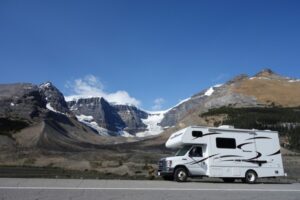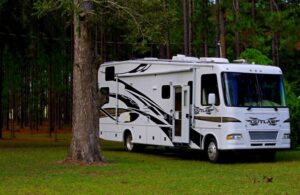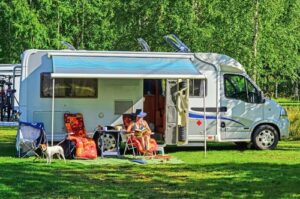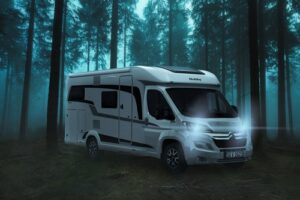5 Important Tips For Buying A Used RV

Buying a used RV isn’t always the easiest process in the world. However, in many ways buying an RV is like the adventures we’ll be taking it on. Any adventure has some risks, rewards and challenges. Likewise, a little preparation is usually all it takes to optimize the benefits while removing potential risks.
These tips for buying a used RV will ensure that it’s a fun process which will set you up for great adventures.
- Make sure that the RV isn’t too big or too small.

One of the most common mistakes people make when buying a used RV relates to its size.
People often compromise and buy RVs which are either too big or too small for their needs. It’s easy to understand why. The used RV market means that we’re often working with a limited selection of options and maybe a budget.
Accepting that we might need to just wait a little longer to find something which matches our needs can prove difficult. However, it’s important to be honest with yourself when deciding if an RV is the right size for your needs.
You should begin by thinking about what sorts of adventure you want to have in the RV?
Who do you want to bring with you on trips?
If you have younger kids it’s also important to remember that both their bodies and needs are going to grow over time. A small child is usually fine heading out with almost nothing. But teenagers often want to pack their entire rooms up in an RV if they’re going on a trip.
An RV is an investment that should provide life experiences for years to come. As such it’s important to really plan out how you see your life going during that time.
Always err on the side of caution when it comes to space in the RV. But at the same time don’t buy an RV camper which is larger than your needs just because it’s a good deal.
The whole point of buying used is to get the most value for your money. And if you’re buying above your needs then you’re essentially spending money on benefits you’ll never use.
- Don’t be afraid to ask some questions about the owner’s history with the RV.

None of us like to pry into another person’s past. However, an exception needs to be made when buying a used vehicle. It’s always important to ask why someone’s selling his RV.
If he’s unwilling to really discuss the topic then there’s a good chance there might be something wrong with it that he’s not mentioning. The best case scenario is an owner who’s just reached a point in life where he can’t travel anymore. In those instances you’ll find out lots of information about how the RV handles.
“People who are filled with great memories of their life on the road in a RV, like to share them.”
It’s a chance to learn more about the vehicle and even make a real connection. You might get a better deal if the owner recognizes a kindred spirit as he talks about his adventures on the road.
- Always ask for a test drive.
Test drives are technically just an option when buying a used RV. However, you’re almost certainly going to want to ask for one. This is a chance for you to really see how the RV handles. Part of this will involve actual driving. But it’s important to really make the RV your own personal space for the duration of a test drive.
You’ll want to pay attention to how it maneuvers. But during the drive you should also make a point of listening to the sounds of the RV.
Listen for any abnormalities with the engine and how it starts. How does it respond and the feel.
Be on the lookout for any odd noises from within the RV as well. You can ask the current owner about any of these sounds. It might be as minor as a latch not closing properly. But random noises can also indicate more expensive issues with the vehicle.

- Make sure to check the little things as well.
Earlier on in our tips for buying a used RV, we noted some smaller issues like improperly closing latches might come up. One or two minor issues aren’t a big deal. But it’s always a good idea to check over all of the potential small problems before coming to a decision.
It’s quite common for us to just brush off seemingly minor issues. But oftentimes what looks like a small issue can be the tip of the iceberg.
For example, you might not think very much of a tiny bit of mold on a ceiling. Before buying the RV you might assume that a quick wipe with some bleach will clear it up. However, that mold could actually be signs of significant water damage which could destroy the RV’s ceiling.
An issue with a few lights might seem minor at first. But it could also be a sign that the electrical system is on its last legs. A brown spot on the floor might seem like a minor stain. But you should try to push down on it to ensure that it’s not a sign of the floor starting to give way.
In short, it’s important to understand as much of the RV as possible.
The minor issues might be just that – minor. But you should always investigate those issues and talk them over with the current owner before making a purchase.
- Get professional opinions if possible.
At this point you might be thinking that you’re not qualified to diagnose every part of the used RV. This is going to be the case for the vast majority of people. Thankfully none of us need to know everything about the subject in order to make an informed purpose.
It’s usually a good idea to have the engine or other important systems checked out by a mechanic. It’s true that this is going to cost you some extra money at first. And this will probably be more than a little annoying if you wind up passing on that particular RV. However, you should instead look at it like paying a small fee to ensure you don’t lose money on a bad purchase.
In the end hiring a mechanic is going to cost far less than the cost of repairing a dying RV.
Conclusion – Tips for buying a used Recreational Vehicle.
Finally, it’s important to bring all of these tips together into a singular whole. Remember to start out by deciding just what size RV you really need.
Next, really talk to the owner about his experiences with the vehicle.
Give it a solid test run both on and off the road. And make sure to have an expert look over everything before buying.
Remember to factor in other costs of not just buying a used RV, but ongoing costs like maintenance and RV insurance in your decision. As different size RVs, models, and age will vary with different costs for insurance and maintenance.
If you keep all of that in mind you should be able to save money and get a great RV.
Happy travels.
Resources and information.
7 Tips for Buying a Used Travel Trailer
What To Look For When Buying A Travel Trailer
14 Of The Best RV Apps To Save Money & Time
